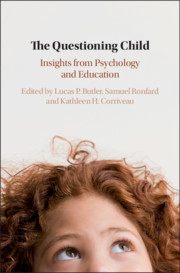Book contents
- The Questioning Child
- The Questioning Child
- Copyright page
- Dedication
- Contents
- Figures
- Tables
- Contributors
- 1 Questions about Questions
- 2 Questions in Development
- 3 The Point, the Shrug, and the Question of Clarification
- 4 The Quest for Comprehension and Learning
- 5 Children’s Question-Asking across Cultural Communities
- 6 The Development of Information-Requesting Gestures in Infancy and Their Role in Shaping Learning Outcomes
- 7 Developmental Changes in Question-Asking
- 8 Understanding Developmental and Individual Differences in the Process of Inquiry during the Preschool Years
- 9 “Why Are There Big Squares and Little Squares?”
- 10 Children’s Questions in Social and Cultural Perspective
- 11 Mothers’ Use of Questions and Children’s Learning and Language Development
- 12 Teaching and Learning by Questioning
- 13 Asking “Why?” and “What If?”
- 14 What Makes a Good Question? Towards an Epistemic Classification
- 15 The Questioning Child
- Index
- References
14 - What Makes a Good Question? Towards an Epistemic Classification
Published online by Cambridge University Press: 10 January 2020
- The Questioning Child
- The Questioning Child
- Copyright page
- Dedication
- Contents
- Figures
- Tables
- Contributors
- 1 Questions about Questions
- 2 Questions in Development
- 3 The Point, the Shrug, and the Question of Clarification
- 4 The Quest for Comprehension and Learning
- 5 Children’s Question-Asking across Cultural Communities
- 6 The Development of Information-Requesting Gestures in Infancy and Their Role in Shaping Learning Outcomes
- 7 Developmental Changes in Question-Asking
- 8 Understanding Developmental and Individual Differences in the Process of Inquiry during the Preschool Years
- 9 “Why Are There Big Squares and Little Squares?”
- 10 Children’s Questions in Social and Cultural Perspective
- 11 Mothers’ Use of Questions and Children’s Learning and Language Development
- 12 Teaching and Learning by Questioning
- 13 Asking “Why?” and “What If?”
- 14 What Makes a Good Question? Towards an Epistemic Classification
- 15 The Questioning Child
- Index
- References
Summary
Students’ questions play an important role in meaningful learning and scientific inquiry. They are a potential resource for both teaching and learning science. Despite the capacity of students’ questions for enhancing learning, much of this potential still remains untapped. The purpose of this chapter, therefore, is to examine and review the existing research on students’ questions and to explore ways of advancing future work into this area. The chapter begins by highlighting the importance and role of students’ questions and the ways in which they have been categorized to argue that there are limitations to each of these. It then seeks to show, drawing on sets of classroom videos, that a schema based on the epistemic function of the question for constructing knowledge would suggest that there are really three categories of question – ontic questions, causal questions, and epistemic questions. The chapter then explores which programs of research offer promise for helping teachers to scaffold students at producing epistemic and better questions.
Keywords
Information
- Type
- Chapter
- Information
- The Questioning ChildInsights from Psychology and Education, pp. 281 - 300Publisher: Cambridge University PressPrint publication year: 2020
